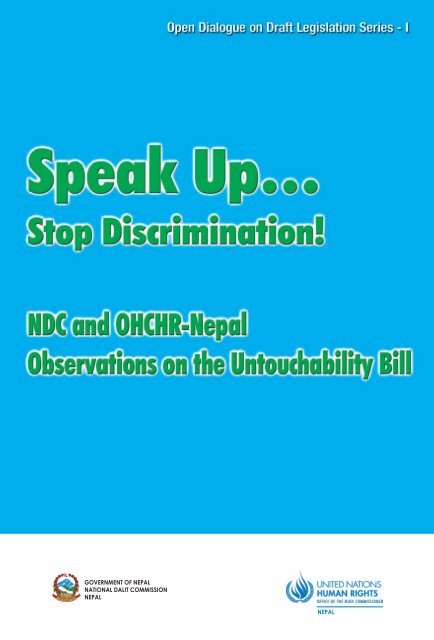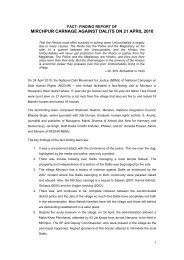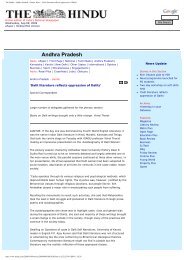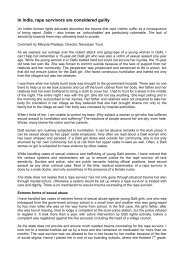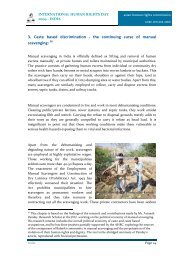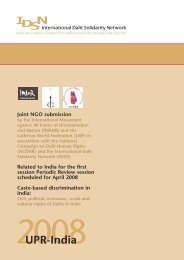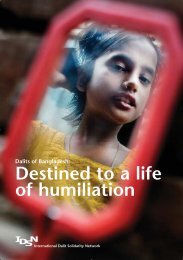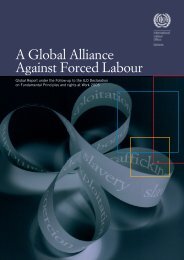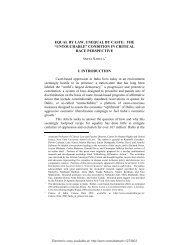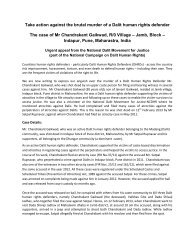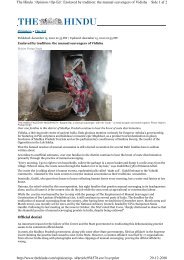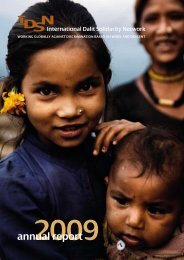Untouchability English - New.pmd - OHCHR-Nepal - Office of the ...
Untouchability English - New.pmd - OHCHR-Nepal - Office of the ...
Untouchability English - New.pmd - OHCHR-Nepal - Office of the ...
- No tags were found...
Create successful ePaper yourself
Turn your PDF publications into a flip-book with our unique Google optimized e-Paper software.
Published in 2010 byNational Dalit Commission <strong>of</strong> <strong>Nepal</strong>The <strong>Office</strong> <strong>of</strong> <strong>the</strong> High Commissioner for Human Rights in <strong>Nepal</strong>© <strong>OHCHR</strong>-<strong>Nepal</strong>, NDC - 2010Printed - December 2010 (2000 copies)For Fur<strong>the</strong>r InformationUnited Nations<strong>Office</strong> <strong>of</strong> <strong>the</strong> High Commissioner for Human Rights in <strong>Nepal</strong>Silu Building, Museum Road, ChhauniP.O. Box 24555, KathmanduTel: 01-4280164, Fax: 01-4670712Email: registry.np@ohchr.org, ohchr-nepal.pio@ohchr.orgGovernment <strong>of</strong> <strong>Nepal</strong>National Dalit Commission <strong>Nepal</strong>Infront <strong>of</strong> Puja Pratisthan MargOld Baneshwor, KathmanduTel: 4473317, 4474336, Fax: 4475989Email: info@ndc.gov.npWebsite: www.ndc.gov.npPrinting - Mass Printing Press, P.O. Box 1217, Kathmandu
Open Dialogue on Draft Legislation Series - ISpeak Up… Stop Discrimination!NDC and <strong>OHCHR</strong>-<strong>Nepal</strong> Observations on <strong>the</strong> <strong>Untouchability</strong> BillI. IntroductionThe water source was on her land, yet she was prohibited fromusing it. When she dared, she was attacked with an axe. Just becauseshe was a Dalit.Practices <strong>of</strong> caste-based discrimination and untouchability are illegal in<strong>Nepal</strong>. However, in many parts <strong>of</strong> <strong>the</strong> country, Dalits - <strong>the</strong> so-called lowestcaste within <strong>the</strong> Hindu caste hierarchy - are still considered to be andtreated as “untouchable”, unable to enjoy <strong>the</strong> same rights and freedomsas o<strong>the</strong>r groups in society. Despite <strong>the</strong> illegality <strong>of</strong> such practices, culturalbarriers, structural poverty and inadequate action by state authoritiesprevent victims from accessing justice. Fur<strong>the</strong>rmore, <strong>the</strong> lack <strong>of</strong> aappropriate legal framework to properly address <strong>the</strong> issue <strong>of</strong>discrimination, and to punish those who discriminate based on caste, isa fur<strong>the</strong>r impediment to progress.Against this reality, <strong>the</strong> submission <strong>of</strong> <strong>the</strong> draft Caste-based Discriminationand <strong>Untouchability</strong> Crime Elimination and Punishment Act to <strong>the</strong>Legislature-Parliament provides an opportunity to improve <strong>the</strong> legislativeframework and fight discriminatory practices. This document assesses<strong>the</strong> draft bill and <strong>of</strong>fers specific recommendations to policy makers ando<strong>the</strong>rs, particularly on how to ensure its consistency with internationalhuman rights standards and best practices. If <strong>the</strong> current shortcomingsare addressed, <strong>the</strong> proposed law could become a pivotal instrument intackling <strong>the</strong> long-standing issue <strong>of</strong> caste-based discrimination anduntouchability in <strong>the</strong> country.II. The context <strong>of</strong> caste-based discriminationThe practices <strong>of</strong> caste-based discrimination and untouchability entailsegregation between Dalits and o<strong>the</strong>r communities, as well as amongDalits <strong>the</strong>mselves. According to traditional beliefs, Dalits are considered1
Open Dialogue on Draft Legislation Series - Ito be “impure” and are stigmatised as “untouchable” to o<strong>the</strong>r castes. In<strong>the</strong> nineteenth century, untouchability was actually codified in law,stratifying <strong>Nepal</strong>i society in a hierarchical system with Dalits at <strong>the</strong> bottom.Although this anachronistic legislation has been since amended, <strong>the</strong>practices continue, violating human rights <strong>of</strong> many <strong>Nepal</strong>is, in particularin less-developed and more remote areas. Dalits are being denied accessto vital resources, such as public water taps, as well as temples,restaurants and o<strong>the</strong>r public places. Occupational segregation impedesaccess to employment, with Dalits restricted to traditionally assignedoccupations, including road-sweeping, lea<strong>the</strong>rwork and even forced sexwork. Despite <strong>the</strong> Government’s commitment to abolish such practices,many Dalits remain trapped in bonded labour relationships. Those whooppose discriminatory practices face <strong>the</strong> risk <strong>of</strong> being ostracised orboycotted or becoming victims <strong>of</strong> violence. In this regard, <strong>OHCHR</strong> and<strong>the</strong> National Dalit Commission have verified through monitoring andreporting incidents <strong>of</strong> physical assault, arson, forced displacement, sexualviolence and labour exploitation. There are several instances where Dalitshave been severely injured and hospitalised, simply on account <strong>of</strong> <strong>the</strong>irDalit identity.III. International obligationsThe Government <strong>of</strong> <strong>Nepal</strong> is obligated to take measures to prohibit castebaseddiscrimination and untouchability under international human rightslaw. Non-discrimination and equality are core international human rightsprinciples, binding on all states. A number <strong>of</strong> international human rightsinstruments, including <strong>the</strong> International Covenant on Civil and PoliticalRights, require <strong>Nepal</strong> to respect and protect <strong>the</strong> right to equality andnon-discrimination <strong>of</strong> all persons within its territory “without distinction<strong>of</strong> any kind”.Fur<strong>the</strong>rmore, under <strong>the</strong> International Convention on <strong>the</strong> Elimination <strong>of</strong> AllForms <strong>of</strong> Racial Discrimination, to which <strong>Nepal</strong> is a State party since1971, <strong>the</strong> Government is obligated to prohibit discrimination based ondescent, which includes caste-based discrimination, as a form <strong>of</strong> “racial2
Open Dialogue on Draft Legislation Series - Idiscrimination”. The Convention fur<strong>the</strong>r obligates <strong>the</strong> Government to takeall appropriate measures, including: enacting legislation to outlaw allforms <strong>of</strong> discrimination; preventing, prohibiting and eliminating practices<strong>of</strong> segregation in housing, education and employment; and securing <strong>the</strong>right to access for everyone to any place or service intended for use by<strong>the</strong> general public.More specifically, under <strong>the</strong> Convention, <strong>the</strong> Government is obligated tocriminalise all acts <strong>of</strong> caste-based discrimination, including <strong>the</strong>dissemination <strong>of</strong> ideas based on caste superiority or hatred. TheConvention fur<strong>the</strong>r obligates <strong>the</strong> Government to ensure a remedy andreparations for victims, regardless <strong>of</strong> whe<strong>the</strong>r <strong>the</strong> perpetrator is a privateindividual or a state <strong>of</strong>ficial. Significantly, <strong>the</strong> victims should also have<strong>the</strong> right to participate in <strong>the</strong> criminal or o<strong>the</strong>r similar procedures against<strong>the</strong> perpetrators with adequate protection against any form <strong>of</strong> intimidationor reprisals.IV. National legislation and existing gapsThe current <strong>Nepal</strong>i legislation meets international obligation to a certainextent. The Interim Constitution guarantees <strong>the</strong> right to equality, providingthat <strong>the</strong>re shall be no discrimination against any citizens based on caste,and fur<strong>the</strong>r prohibits untouchability in any form, establishing liability <strong>of</strong><strong>the</strong> perpetrator and entitling <strong>the</strong> victim to compensation. The InterimConstitution also prohibits denial <strong>of</strong> access to, or use <strong>of</strong>, any public places,goods or services on <strong>the</strong> basis <strong>of</strong> caste, and <strong>the</strong> encouragement <strong>of</strong> castesuperiority. In addition to <strong>the</strong> Interim Constitution, <strong>the</strong> Civil Code (MulukiAin) criminalises “discriminatory behaviour <strong>of</strong> untouchability” along with“boycotts or restrictions against any person on <strong>the</strong> basis <strong>of</strong> caste”,penalising such acts with imprisonment and/or fine.However, <strong>the</strong> current legislation has proved inadequate and ineffectiveto actually curb discriminatory practices. The lack <strong>of</strong> a proper definition<strong>of</strong> what constitutes “caste-based discrimination” or “untouchability”makes prosecution difficult, and to a certain excent explains <strong>the</strong>authorities’ reluctance to do so. Partly because <strong>of</strong> <strong>the</strong> vagueness <strong>of</strong> <strong>the</strong>3
Open Dialogue on Draft Legislation Series - Iprovision in <strong>the</strong> Civil Code, police and o<strong>the</strong>r government <strong>of</strong>ficials rarelyinvestigate such acts as crimes and seek instead to settle cases outside<strong>of</strong> <strong>the</strong> criminal justice system, <strong>of</strong>ten through informal ‘mediations’.Fur<strong>the</strong>rmore, <strong>the</strong> penalties do not correspond with <strong>the</strong> seriousness <strong>of</strong><strong>of</strong>fences and <strong>the</strong> 35 day limit to register a case is far too short.Significantly, <strong>the</strong> provisions <strong>of</strong> <strong>the</strong> Civil Code do not provide anycompensation for victims in contradiction <strong>of</strong> constitutional requirements.V. Analysis <strong>of</strong> <strong>the</strong> draft billThe submission in July 2009 <strong>of</strong> <strong>the</strong> draft Caste-based Discriminationand <strong>Untouchability</strong> Crime Elimination and Punishment Act to <strong>the</strong>Legislative Parliament seems to indicate <strong>the</strong> Government’s will to addressthis issue. <strong>OHCHR</strong> welcomes this initiative as a step towards fulfilling<strong>Nepal</strong>’s international legal obligations to eliminate caste-baseddiscrimination. The current draft has some significant strength, including<strong>the</strong> following:• Penalising <strong>the</strong> practice <strong>of</strong> caste-based discrimination anduntouchability in many areas, including access to public places andfacilities, provision <strong>of</strong> goods and services and in employment;• Criminalising incitement to commit caste-based discrimination and<strong>the</strong> promotion <strong>of</strong> impediments to inclusion;• Ensuring confidentiality <strong>of</strong> information received during investigations,and allowing <strong>the</strong> police to be assisted by civil society organisationswhen investigating incidents <strong>of</strong> caste-based discrimination;• Providing increased punishments for public <strong>of</strong>ficials foundresponsible <strong>of</strong> discrimination;• Requiring <strong>the</strong> perpetrator to provide compensation to <strong>the</strong> victim,including provision for medical treatment or additional expenses tocover damages; and• Expediting criminal proceedings under <strong>the</strong> Summary ProcedureAct.4
Open Dialogue on Draft Legislation Series - IHowever, many areas <strong>of</strong> <strong>the</strong> bill require improvement for <strong>the</strong> law to have<strong>the</strong> desired impact. The following are key shortcomings that should beaddressed to streng<strong>the</strong>n <strong>the</strong> current bill:1. Codifying international legal commitments - The bill’s preamble doesnot adequately stress <strong>the</strong> Government’s obligations underinternational human rights law or <strong>the</strong> relevant rights as expressed in<strong>the</strong> Interim Constitution. The preamble must reflect <strong>the</strong> Conventionon <strong>the</strong> Elimination <strong>of</strong> All Forms <strong>of</strong> Racial Discrimination and <strong>the</strong>constitutional guarantees.2. Defining caste-based discrimination - The draft fails to define <strong>the</strong>terms “caste-based discrimination” and “untouchability”. To ensureprosecution and punishment for such <strong>of</strong>fences, it is essential to define<strong>the</strong>m. The definition should cover all forms <strong>of</strong> discriminatorypractices, whe<strong>the</strong>r in public or private places.3. Classifying <strong>of</strong>fences - Acts considered to amount to caste-baseddiscrimination must be fully listed, toge<strong>the</strong>r with an indication <strong>of</strong> <strong>the</strong>seriousness <strong>of</strong> each act. The draft bill should categorise <strong>the</strong> <strong>of</strong>fencesand <strong>the</strong>ir relative level <strong>of</strong> seriousness.4. Clarifying duties <strong>of</strong> law enforcement <strong>of</strong>ficers registering complaints- The draft bill fails to provide guidance that obligates a police <strong>of</strong>ficerto immediately act upon a submitted complaint. Given <strong>the</strong> currentreality where hesitation by <strong>the</strong> police contributes to inadequateprosecutions, <strong>the</strong> bill should set out <strong>the</strong> detailed roles andresponsibilities <strong>of</strong> law enforcement <strong>of</strong>ficers, including:- Automatic initiation <strong>of</strong> criminal investigation when <strong>the</strong> police isinformed by any sources <strong>of</strong> any <strong>of</strong>fences under <strong>the</strong> bill;- Immediate attendance at <strong>the</strong> scene when <strong>the</strong> police receiveinformation that an <strong>of</strong>fence is imminent, in progress or hasoccurred;- Prompt investigation and recording <strong>of</strong> any complaint in detail toaid competent and impartial prosecutions;5
Open Dialogue on Draft Legislation Series - I- Advising <strong>the</strong> victim <strong>of</strong> his or her rights in a language understoodby <strong>the</strong> victim; and- Provision for <strong>the</strong> protection <strong>of</strong> victims, <strong>the</strong>ir families andwitnesses.5. Providing appropriate sanctions - The provisions for punishment in<strong>the</strong> draft bill fail to correspond to seriousness <strong>of</strong> each <strong>of</strong>fence.Punishment for aiding and abetting is not provided. Aggravatingcircumstances <strong>of</strong> <strong>of</strong>fences under <strong>the</strong> bill are not provided, exceptwhere public <strong>of</strong>ficials are involved. The draft bill should ensure that<strong>the</strong> punishment is proportionate to <strong>the</strong> severity <strong>of</strong> <strong>of</strong>fence, injuryand/or loss suffered by <strong>the</strong> victim. Fur<strong>the</strong>rmore, where o<strong>the</strong>r criminal<strong>of</strong>fences are committed in <strong>the</strong> context <strong>of</strong> caste-based discrimination,<strong>the</strong> context should be considered an aggravating circumstance withadditional penalties.6. Extending statute <strong>of</strong> limitations - The proposed 90 day statute <strong>of</strong>limitation is longer than <strong>the</strong> general 35 day limitation for o<strong>the</strong>r crimes,but remains inadequate. Considering <strong>the</strong> seriousness <strong>of</strong> <strong>of</strong>fences,as well as challenges in filing a complaint on time (including lack <strong>of</strong>awareness <strong>of</strong> legal procedures, geographical distance and expensesto reach <strong>the</strong> nearest police <strong>of</strong>fice), it should be extended to at leastone year.7. Setting out positive obligations <strong>of</strong> <strong>the</strong> Government - Considering <strong>the</strong>nature <strong>of</strong> <strong>the</strong> <strong>of</strong>fences and going beyond a typical criminal legislation,this bill should contain positive duties <strong>of</strong> <strong>the</strong> Government to tacklecaste-based discrimination. These should include <strong>the</strong> requirementto educate <strong>the</strong> police and communities about <strong>the</strong> legislation, itsenforcement and <strong>the</strong> illegal nature <strong>of</strong> discriminatory practices.6
Open Dialogue on Draft Legislation Series - IVI. Conclusions and recommendationsGiven <strong>the</strong> prevalence <strong>of</strong> practices <strong>of</strong> caste-based discrimination anduntouchability in <strong>Nepal</strong>, and <strong>the</strong> implications on <strong>the</strong> enjoyment <strong>of</strong> humanrights by many, <strong>the</strong> submission <strong>of</strong> <strong>the</strong> bill is a positive step forward.However, as described, it requires streng<strong>the</strong>ning to be a genuine tool tocurb discriminatory practices. <strong>OHCHR</strong> and <strong>the</strong> National Dalit Commission<strong>of</strong>fer <strong>the</strong> following recommendations to relevant stakeholders to ensureimproved legislation that will contribute to ending caste-baseddiscrimination and untouchability:To <strong>the</strong> Legislative-Parliament and <strong>the</strong> Government:• Publicise <strong>the</strong> details <strong>of</strong> <strong>the</strong> bill to seek <strong>the</strong> views <strong>of</strong> <strong>the</strong> general publicon its contents, as provided under <strong>the</strong> Constituent Assembly(Legislative Functions) Rules.• Organise a wider consultation with <strong>the</strong> Dalit community, civil societyand o<strong>the</strong>r stakeholders on <strong>the</strong> draft bill.• Revise <strong>the</strong> bill in line with national and international obligations, andin light <strong>of</strong> consultations, prior to its adoption.To civil society organisations:• Coordinate advocacy and lobbying to ensure <strong>the</strong> revision and,<strong>the</strong>reupon, passage <strong>of</strong> <strong>the</strong> bill.To <strong>the</strong> international community:• Support <strong>the</strong> Government and civil society in <strong>the</strong>ir efforts for <strong>the</strong> swiftpassage <strong>of</strong> <strong>the</strong> bill following its revision and <strong>the</strong> wider publicconsultation.• Provide technical as well as financial assistance to effectivelyimplement <strong>the</strong> legislation after it comes into force.To all actors:• Upon <strong>the</strong> enactment <strong>of</strong> <strong>the</strong> legislation, work toge<strong>the</strong>r to raiseawareness among rights holders and duty bearers on its contents.7
Open Dialogue on Draft Legislation Series - IReference materialsInternational Covenant on Civil and Political Rights (1966)www2.ohchr.org/english/law/ccpr.htm.Human Rights Committee: “CCPR General Comment No. 18: Non-discrimination”(10 November 1989)www.unhchr.ch/tbs/doc.nsf/0/3888b0541f8501c9c12563ed004b8d0e?Opendocument.International Convention on <strong>the</strong> Elimination <strong>of</strong> All Forms <strong>of</strong> Racial Discrimination [CERD](1965)www2.ohchr.org/english/law/cerd.htm.Committee on <strong>the</strong> Elimination <strong>of</strong> Racial Discrimination: “General Recommendation No. 31on <strong>the</strong> prevention <strong>of</strong> racial discrimination in <strong>the</strong> administration and functioning <strong>of</strong> <strong>the</strong>criminal justice system” (2005)www2.ohchr.org/english/bodies/cerd/docs/GC31Rev_En.pdf.- “Concluding observations <strong>of</strong> <strong>the</strong> Committee on <strong>the</strong> Elimination <strong>of</strong> RacialDiscrimination in relation to <strong>Nepal</strong>” (March 2004).- “General Recommendation No. 29: Article 1, paragraph 1 <strong>of</strong> <strong>the</strong> Convention(Descent)” (2002)www.unhchr.ch/tbs/doc.nsf/(Symbol)/f0902ff29d93de59c1256c6a00378d1f?Opendocument.The Interim Constitution <strong>of</strong> <strong>Nepal</strong>, 2063 (2007).The Civil Code (Muluki Ain) <strong>of</strong> <strong>Nepal</strong> (1854).Supreme Court <strong>of</strong> <strong>Nepal</strong>: Ratna Bahadur Bagchand v. The Secretariat <strong>of</strong> Council <strong>of</strong>Ministers (21 April 2005).8
Open Dialogue on Draft Legislation Series - I10


